Henry Inman (painter)
Henry Inman (October 20, 1801 – January 17, 1846) was an American portrait, genre, and landscape painter.[1]
Henry Inman | |
|---|---|
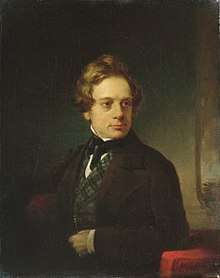 Painting of Inman by Jacob Hart Lazarus, circa 1837–1840, Metropolitan Museum of Art | |
| Born | October 20, 1801 |
| Died | January 17, 1846 (aged 44) Manhattan, New York |
| Spouse(s) | Jane Riker O'Brien
( m. 1822; |
| Children | John O'Brien Inman Henry Inman, Jr. |
Early life
He was born at Utica, N.Y. to English immigrant parents who were among the first settlers of Utica.[2] His family moved to New York City in 1812.[1]
Beginning in 1814 and continuing for the next seven years, he was an apprentice pupil of John Wesley Jarvis in New York City, along with John Quidor.[3][4]
Career
He was the first vice president of the National Academy of Design. He excelled in portrait painting, but was less careful in genre pictures. Among his landscapes are Rydal Falls, England, October Afternoon, and Ruins of Brambletye. His genre subjects include Rip Van Winkle, The News Boy, and Boyhood of Washington. His portraits include those of Henry Rutgers and Fitz-Greene Halleck in the New York Historical Society. He also painted portraits of Angelica Singleton Van Buren, Bishop White, Chief Justices Marshall and Nelson, Jacob Barker, William Wirt, Audubon, DeWitt Clinton, Richard Varick, Martin Van Buren, Francis L. Hawks, and William H. Seward.[2]
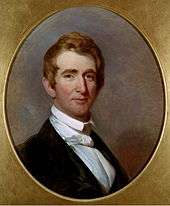 William Henry Seward around 1844.
William Henry Seward around 1844.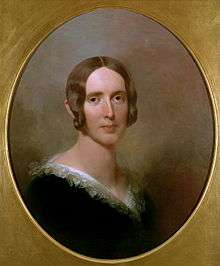 Seward's wife Frances Adeline Seward
Seward's wife Frances Adeline Seward
Thomas L. McKenney assigned Inman, who was an accomplished lithographer, the task of copying more than a hundred oil paintings of Native American leaders by Charles Bird King to translate into a printed book, the History of the Indian Tribes of North America.[5] The oil paintings are now in the collections of White House, the Joslyn Art Museum, and the Amon Carter Museum of American Art, among others. In the Metropolitan Museum, New York, are his Martin Van Buren, The Young Fisherman, and William C. Maccready as William Tell.[6]
During a year spent in England in 1844–1845, he painted Wordsworth, Macaulay, John Chambers, Sir William Stewart, Baronet of Blair and other celebrities.[7]
At the time of his death, he was engaged on a series of historical pictures for the Capitol at Washington. He was also president of National Academy of Design.[8]
Among his pupils was the portraitist and still life painter Thomas Wightman.
Personal life
In 1822, Inman was married to Jane Riker O'Brien (1796–1873). Together, they were the parents of:[1]
- Mary Lawrence Inman (1826–1860), who married Smith Cutter Coddington (1812–1868) in 1844.
- John O'Brien Inman (1828–1896), who was also a painter.[1][9][10]
- Mary Lucy Inman (1828–1907), who married William Vail (1815–1880)
- Henry Inman, Jr. (1837–1899),[11][12] a writer who married Eunice Churchill Dyer (1842–1922) in 1862.[13]
Inman died on January 17, 1846 after returning from England to America due to failing health.[8]
Selected works
- Paintings by Henry Inman
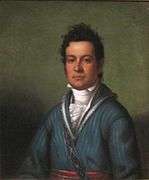 Portrait of David Vanon (c. 1832–33)
Portrait of David Vanon (c. 1832–33)_-_Google_Art_Project.jpg) Portrait of Angelica Singleton Van Buren (c. 1842), White House Collection
Portrait of Angelica Singleton Van Buren (c. 1842), White House Collection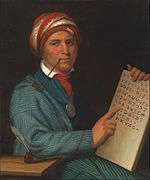 Portrait of Sequoyah (c. 1830), National Portrait Gallery (United States)
Portrait of Sequoyah (c. 1830), National Portrait Gallery (United States)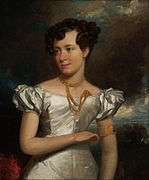 Portrait of Clara Fisher (c. 1828), Indianapolis Museum of Art
Portrait of Clara Fisher (c. 1828), Indianapolis Museum of Art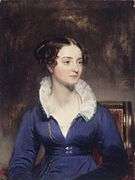 Portrait of a Woman (c. 1825), Brooklyn Museum
Portrait of a Woman (c. 1825), Brooklyn Museum_-_Google_Art_Project.jpg) Portrait of No-Tin (Wind) (c. 1832–33), Los Angeles County Museum of Art
Portrait of No-Tin (Wind) (c. 1832–33), Los Angeles County Museum of Art- Portrait of Cornelia Rutgers Livingston (c. 1833), New Britain Museum of American Art
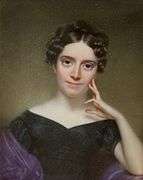 Portrait of Mrs. William Samuel Johnson (c. 1823), Yale University Art Gallery
Portrait of Mrs. William Samuel Johnson (c. 1823), Yale University Art Gallery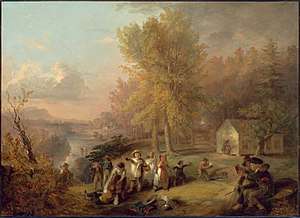
References
- Caldwell, John; Roque, Oswaldo Rodriguez; Johnson, Dale T. (1994). American Paintings in The Metropolitan Museum of Art. Vol. 1: A Catalogue of Works by Artists Born by 1815. Metropolitan Museum of Art. p. 450. Retrieved 26 July 2017.
- Dunlap, William; Bayley, Frank William; Goodspeed, Charles Eliot (1918). A History of the Rise and Progress of the Arts of Design in the United States. Boston : C.E. Goodspeed & Co. Retrieved 26 July 2017.
- Roger Panetta, ed. (2009). Dutch New York: the roots of Hudson Valley culture. Hudson River Museum. pp. 223–235. ISBN 978-0-8232-3039-6.
- Caldwell, John; Rodriguez Roque, Oswaldo (1994). Kathleen Luhrs (ed.). American Paintings in the Metropolitan Museum of Art. Volume I: a Catalogue of Works by Artists Born By 1815. Dale T. Johnson, Carrie Rebora, Patricia R. Windels. The Metropolitan Museum of Art in association with Princeton University Press. pp. 479–482.
- Gerdts, William. The Art of Henry Inman.
- "Henry Inman | LACMA Collections". collections.lacma.org. Retrieved 26 July 2017.
- Harris, Neil (1966). The Artist in American Society: The Formative Years. University of Chicago Press. ISBN 9780226317540. Retrieved 26 July 2017.
- "Henry Inman". The Plattsburgh Republican. January 31, 1846. Retrieved 26 July 2017.
- Tuckerman, Henry Theodore (1867). Book of the Artists. American artist life, comprising biographical and critical sketches of American artists: preceded by an historical account of the rise and progress of art in America. New York: G. P. Putnam & sons. Retrieved 26 July 2017.
- "Antiques & Fine Art – John O'Brien Inman – Biography". www.antiquesandfineart.com. Retrieved 26 July 2017.
- Thrapp, Dan L. (1991). Encyclopedia of Frontier Biography: G-O. University of Nebraska Press. p. 704. ISBN 0803294190. Retrieved 26 July 2017.
- Lossing, Benson John; Wilson, Woodrow (1915). Harper's Encyclopedia of United States History from 458 A.D. to 1915. Harper Bros. p. 42. Retrieved 26 July 2017.
- Underhill, Lora Altine Woodbury (1910). Descendants of Edward Small of New England, and the Allied Families, with Tracings of English Ancestry. Priv. Print. at the Riverside Press. p. 1710. Retrieved 26 July 2017.
- This article incorporates text from a publication now in the public domain: Gilman, D. C.; Peck, H. T.; Colby, F. M., eds. (1905). New International Encyclopedia (1st ed.). New York: Dodd, Mead. Missing or empty
|title=(help)
External links
| Wikimedia Commons has media related to Henry Inman. |
- Art and the empire city: New York, 1825–1861, an exhibition catalog from The Metropolitan Museum of Art (fully available online as PDF), which contains material on Inman (see index)
- Gallery of Henry Inman's works, Art Authority
- Henry Inman collection at the New-York Historical Society